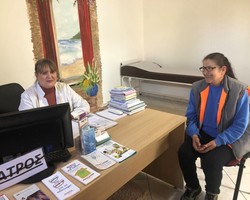Supporting Greece in improving equitable access to SRMNCAH services

WHO
To support Greece in achieving universal health coverage (UHC), WHO has been conducting an assessment of the country’s sexual, reproductive, maternal, newborn, child and adolescent health (SRMNCAH) services. The findings of the assessment will identify potential barriers and inform feasible and practical options and policy recommendations for Greece to improve in these areas. This in turn will contribute to achieving UHC, so that all people have access to the health services they need, when and where they need them, without incurring financial hardship.
The assessment included an initial review, with the collection of all relevant information, such as the plans for the country’s health system and UHC, priorities for health system development, funding mechanisms and epidemiological data. This was followed by a visit to Greece on 3–7 February 2020, which included interviews with key informants, policy-makers, health professionals, services providers and users, and other stakeholders, and field visits to health facilities at the primary and secondary level in urban and rural areas. Among the facilities visited were “Agia Sofia” Children’s Hospital, Vari Health Centre, Astros Health Centre and Eleonas Refugee Camp. Discussions included representatives from the Ministry of Health, the Child Health Institute, the National Public Health Organization (EODY) and the National Organization for the Provision of Health Services (EOPYY).
As the assessment could not include the whole spectrum of services, it focused on six tracers through which potential health system barriers to the provision of SRMNCAH services could be identified. These services include:
- antenatal care
- sexually transmitted infections
- neonatal transport
- case management of common childhood conditions
- sexual and reproductive health services for adolescents
- immunization.
Large variations between the public and private sector
Preliminary findings of the assessment point to large variations between the public and private sector, in terms of quality and access. They also reveal a lower allocation of public resources compared to the WHO European Region average and a high level of out-of-pocket payments, as well as increased over-the-counter use of drugs and antibiotics, and complex vaccine administering procedures. The findings show discrepancies with regards to age criteria in different aspects of the system and legal framework. For example, patients aged 16 are not legally considered adults and yet they can no longer be seen by a paediatrician.
These findings were presented and discussed with the Ministry of Health at the end of the mission, the feedback from which will be incorporated in the final report.
Achieving UHC
Achieving UHC is one of the targets of the Sustainable Development Goals (SDGs) and is a strategic priority in WHO’s 13th General Programme of Work. SRMNCAH is key to achieving UHC, with 16 essential health services among the indicators of the level and equity of coverage in countries. The assessment in Greece is one of many which WHO conducts in the European Region to identify scope, access and financial protection in health systems and support countries in achieving universal access to services for women and children.



